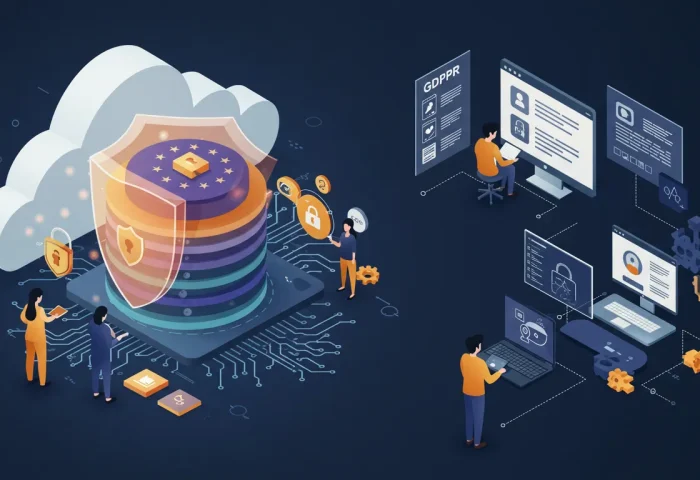With the rapid growth in digitalisation and technological advancement, cybercrime and data hacking have become a new threat. In the Indian business environment, customer personal data is one of the most valuable assets. Now, relying on spreadsheets and Excel to secure data is not an option; companies need stronger and secure tools. Weak data practices can lead to reputational damage, legal complications, and customer distrust. Therefore, several CRMs come with advanced security features, assuring compliance with both domestic and international regulations. In this blog, you will get a detailed understanding of what CRM software for data security is and the features to look for while selecting the best customer relationship management software in India. With the help of the right software, Indian businesses can develop transparency, build trust with customers and accelerate future-proof operations.
Why CRM Data Security and Compliance Matters
For Indian businesses, especially dealing with global clients or storing large amounts of data on cloud platforms abroad, security and compliance are more than just IT issues; they are strategic priorities. With the enforcement of India’s Digital Personal Data Protection Act (DPDP) and the applicability of GDPR for businesses serving European customers, data handling should always be secure, ethical, and traceable.
Here’s what’s at risk with poor CRM data security:
- Cyberattacks and data breaches that expose sensitive customer details
- Regulatory fines from non-compliance with GDPR, DPDP, or industry-specific rules
- Loss of customer trust, which affects retention and referrals
- Operational inefficiencies due to a lack of secure data workflows
Using CRMs to standardise security practices helps Indian companies enforce best practices, reduce risks, and align with evolving data protection norms.
Understanding GDPR, DPDP, and Compliance in the Indian Context
While GDPR is a European regulation, many Indian IT firms, SaaS companies, exporters, and service providers fall under its scope due to their international clientele. Meanwhile, India’s own DPDP Act, expected to be fully enforced soon, mandates explicit consent, purpose limitation, data minimisation, and rights for individuals.
Here are the key principles Indian companies must follow under these regulations:
- User Consent: Obtain clear consent before collecting or using data
- Right to Access and Erasure: Allow users to see and delete their data
- Purpose Limitation: Use data only for the reason it was collected
- Compliance Audits: Maintain records and proof of compliance
The best customer relationship management software comes equipped with features that help businesses manage these legal requirements, such as automated consent tracking, encrypted data storage, and user rights management.
Features of the Best CRM Tools in India for Security and Compliance
Whether you’re a B2B tech firm in Bangalore, a D2C brand in Mumbai, or a service agency in Delhi, the best CRM tools in India will offer built-in functionalities for secure and compliant data handling.
1. Role-Based Access Control
Limit access based on job function—sales people see leads, finance teams see billing info. This is essential for CRMs for large enterprises with multi-level hierarchies.
2. End-to-End Data Encryption
Ensure data is encrypted both when stored (at rest) and when being transmitted (in transit). This protects customer data from unauthorized access.
3. Consent Management Modules
Automatically record when and how a customer gave consent to receive communications—via web forms, emails, or SMS campaigns—ensuring GDPR and DPDP compliance.
4. Audit Logs for Accountability
The best customer relationship management software tracks all data interactions, offering visibility into who accessed what and when. This is crucial during internal audits or legal scrutiny.
5. Data Erasure and Anonymisation Tools
When a customer opts out, your CRM should allow secure deletion or anonymisation of their data without disrupting your database.
6. Secure Hosting and Compliance Certifications
Choose CRMs hosted on secure Indian data centres or global ones that follow ISO 27001 and GDPR-compliant practices. Look for certifications like SOC 2 for added assurance.
How to Use CRM for Data Security and GDPR Compliance: Step-by-Step Guide
Step 1: Audit Your CRM Environment
Indian businesses should start by identifying what personal data they collect, how it’s stored, and who has access to it. Audit third-party integrations that pull or push customer data.
Step 2: Define Your Compliance Strategy
Based on your industry and clientele, outline policies for data collection, consent, and user rights. Document these in your CRM settings and employee guidelines.
Step 3: Apply Role-Based Access and Encryption
Set up different permission levels for sales, marketing, finance, and support teams. Ensure encryption protocols are enabled on all customer-facing forms and backend systems.
Step 4: Use Consent Management Tools
Deploy opt-in checkboxes, email consent forms, and consent logs for all marketing activities. This is especially important for Indian businesses with global outreach.
Step 5: Implement Data Retention Policies
Not all data needs to be stored forever. Create rules to auto-delete inactive contacts after a certain period or anonymise old customer records.
Step 6: Train Your Teams
Train your team on privacy policies, secure data handling, and recognising potential breaches.
Step 7: Schedule Regular Compliance Reviews
Make security and compliance a recurring agenda. Run monthly or quarterly checks to ensure CRM settings align with updated laws and company policies.
Best Practices for Maintaining CRM Security in Indian Businesses
- Use Indian or GDPR-compliant cloud hosting providers for data localisation.
- Limit the use of spreadsheets or offline data sharing, which often bypass CRM security.
- Regularly update passwords and enable two-factor authentication for users.
- Keep plugins and integrations up to date to avoid vulnerabilities.
- Create an incident response plan in case of a data breach.
- Use CRMs with compliance dashboards that display data health and risk levels.
Benefits of Secure and Compliant CRM Systems
- Increased Customer Trust: Builds a brand reputation for ethical handling of data
- Regulatory Protection: Avoid hefty penalties from GDPR or DPDP violations
- Stronger Data Accuracy: Centralised and secure systems reduce duplication and errors.
- Global Market Readiness: Makes Indian businesses eligible to serve overseas clients
- Operational Efficiency: Automation of consent, data deletion, and access logs saves time.
In this highly competitive environment, what matters the most is the trust and loyalty of customers, and for that, businesses need to strictly align with the legal compliance and security standards. CRM software plays well in maintaining such a situation in a business environment. Most of the CRM software strictly follows the legal standards to secure the personal and confidential information of its customers. If you strictly prioritise security and the personal data of your customers, and want a software to protect it, you can freely switch to DoInsights. Here, you will get a user-friendly interface and a high level of protection. One of the best examples of this is its level-based permission feature. It means that if you are an executive, your features are limited according to your needs, and if you are a leader or manager, your features and level of authority will increase accordingly. These features make the tool more secure and ensure that the data of customers is in safe hands.


